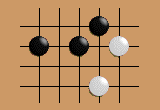
Evanston Go Club
What is Go?
Go is a fascinating board game that originated in China more
than 4,000 years ago. Also known as baduk, wei ch'i, weiqi,
and igo, it is played today by millions of people, including
thousands in the United States. In Japan, Korea, China, and
Taiwan, it is far more popular than chess is in the West,
and professional players compete for large cash prizes. Its
popularity in this country continues to grow, more than
fifty years after the founding of the American Go
Association.
It is said that the rules of Go can be learned in minutes,
but that it can take a lifetime to master the game. Two
players alternate placing black and white stones on a large
(19x19 line) ruled board, with the aim of surrounding
territory. Stones are never moved, and only removed if they
are completely surrounded. The game rewards patience and
balance over aggression and greed; the balance of influence
and territory may shift many times in the course of a game,
and a strong player must be prepared to be flexible but
resolute. Like the Eastern martial arts, Go can teach
concentration, balance, and discipline.
Go combines beauty and intellectual challenge. It is a game
of pure skill; there is no chance involved. The patterns
formed by the black and white stones are visually striking
and can exercise an almost hypnotic attraction as one "sees"
more and more in the constantly evolving positions.
The game appeals to many kinds of minds -- to musicians,
artists, mathematicians, computer programmers, entrepreneurs
and options traders. Children learn the game readily and can
reach high levels of mastery. Interestingly, computers are
not yet capable of playing Go at any but the most
rudimentary levels. Go seems to require innately human
skills; visual pattern recognition, judgement of the
relative value of positions, knowing when to sacrifice
unimportant stones for important ones, and a "feel" for the
right move.
Because Go lends itself to a uniquely reliable system of
handicaps, players of widely disparate strengths can enjoy
relatively even contests. The game can be a casual pastime
for the idle hour -- or a way of life.
